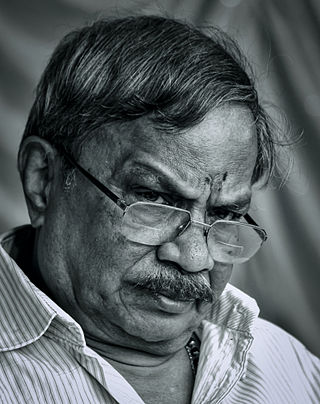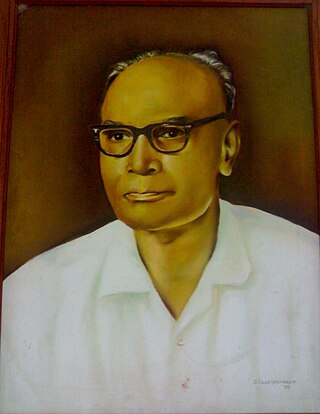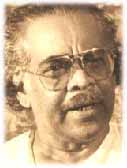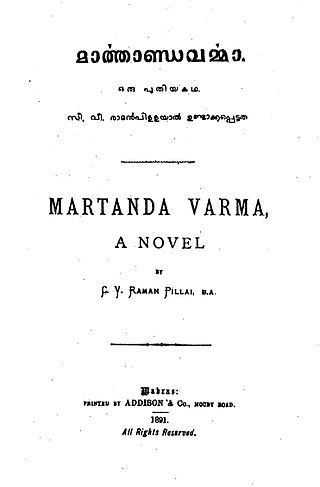Pillai or Pillay, meaning "Child of King" (Prince) or "Child", is a surname found among the Malayalam and Tamil-speaking people of India and Sri Lanka.

Madath Thekkepaattu Vasudevan Nair, popularly known as M.T., is an Indian author, screenplay writer and film director. He is a prolific and versatile writer in modern Malayalam literature, and is one of the masters of post-Independence Indian literature. At the age of 20, as a chemistry undergraduate, he won the prize for the best short story in Malayalam at World Short Story Competition conducted by The New York Herald Tribune. His first major novel Naalukettu, written at the age of 23, won the Kerala Sahitya Akademi Award in 1958. His other novels include Manju (Mist), Kaalam (Time), Asuravithu and Randamoozham. The deep emotional experiences of his early days have gone into the making of MT's novels. Most of his works are oriented towards the basic Malayalam family structure and culture and many of them were path-breaking in the history of Malayalam literature. His three seminal novels on life in the matriarchal family in Kerala are Naalukettu, Asuravithu, and Kaalam. Randamoozham, which retells the story of the Mahabharatha from the point of view of Bhimasena, is widely credited as his masterpiece.
The literature of Singapore comprises a collection of literary works by Singaporeans. It is written chiefly in the country's four official languages: English, Malay, Standard Mandarin and Tamil.

Thakazhi Sivasankara Pillai, popularly known as Thakazhi after his place of birth, was an Indian novelist and short story writer of Malayalam literature. He wrote over 30 novels and novellas and over 600 short stories focusing on the lives of the oppressed classes. Known for his works such as Kayar and Chemmeen, Pillai was a recipient of the Padma Bhushan, the third highest Indian civilian award. He was also a recipient of the Jnanpith Award, India's highest literary award, awarded in 1984 for the novel Kayar.
M. G. G. Pillai was a Malaysian journalist and political activist. He was one of the country's pioneers in Internet-based journalism and activism. His parents were immigrants from Kerala, India. His great maternal uncle, Thakazhi Sivasankara Pillai was a celebrated Malayalam novelist. True to the matrilineal tradition of the Nair caste, he had a reverential relationship with Thakazhi. Thakazhi in turn was proud of his nephew's journalistic pursuits. M. G. G. Pillai was married to P.C. Jayasree. They have two sons, Sreekant Pillai and Sreejit Pillai.

P. Kesava Pillai, better known by his pen-name P. Kesavadev, was a novelist and social reformer of Kerala, India. He is remembered for his speeches, autobiographies, novels, dramas, short stories, and films. Odayil Ninnu, Nadhi, Bhrandalayam, Ayalkar, Ethirppu (autobiography) and Oru Sundariyude Athmakadha are some among his 128 literary works. Kesavadev along with Thakazhi Sivasankara Pillai and Vaikom Muhammad Basheer are considered the exponents of progressive Malayalam Literature.

K. Bhaskaran Nair, professionally credited by his stage name Adoor Bhasi, was an Indian actor and film director. He was mostly cast as a sidekick to protagonists, particularly Prem Nazir. His comedic roles were widely appreciated in Malayalam films of the 1950s, 1960s, 1970s and 1980s. Bhasi has also done leading and character roles. He directed three Malayalam films in the late 1970s. Bhasi is also known for his eloquent speeches in fluent English. He has won Kerala State Film Awards, including two Best Actor and one Second Best Actor.

Cannankara Velayudhan Raman Pillai, also known as C. V., was one of the major Indian novelists and playwrights and a pioneering playwright and novelist of Malayalam literature. He was known for his historical novels such as Marthandavarma, Dharmaraja and Ramaraja Bahadur; the last mentioned considered by many as one of the greatest novels written in Malayalam.
Karoor Neelakanta Pillai was an Indian writer of Malayalam literature and one of the founders of Sahithya Pravarthaka Co-operative Society. Some of his works such as Poovan Pazham and Marappavakal are counted by many among the best short stories in Malayalam. He was a recipient of the Kerala Sahitya Akademi Award for Children's Literature in 1960, which he received for his work Anakkaran, and the Kerala Sahitya Akademi Award for Story in 1969, which he received for his short story Mothiram.

Sooranad Payikkattu Neelakanta Kunjan Pillai was an Indian researcher, lexicographer, poet, essayist, literary critic, orator, grammarian, educationist, and scholar of the Malayalam language, best remembered for his contributions in compiling Malayala Maha Nighantu, a lexicon. The Government of India awarded him the fourth highest civilian honour of the Padmashri in 1984 for his contribution to Malayalam literature and education. He was also a recipient of the Vallathol Award in 1992 and when the Government of Kerala instituted the Ezhuthachan Puraskaram, their highest literary honour in 1993, he received the inaugural award.

Marthandavarma is a historical romance novel by C. V. Raman Pillai published in 1891. Taking place between 1727 and 1732, the story follows three protagonists as they try to protect Marthanda Varma's position as the king of Venad from Padmanabhan Thambi and the Ettu Veetil Pillamar, both of whom want to oust him from the throne.
Sankara Pillai Guptan Nair or S. Guptan Nair was an Indian scholar, academic, critic and writer of Malayalam literature.

University College, Thiruvananthapuram, often abbreviated as UCT, is a public college situated in Palayam, Thiruvananthapuram, India. Established in 1866, it is one of the oldest colleges in Kerala. The college has been accorded "College with Potential for Excellence" (CPE) status by the University Grants Commission. University College is identified as a heritage institution by the Government of Kerala.

Vazhve Mayam is a 1970 Malayalam-language film, directed by K. S. Sethumadhavan. Sathyan plays the lead role. The film also has Sheela, Sankaradi, K. P. Ummer, Bahadoor, Adoor Bhasi, K. P. A. C. Lalitha, Khadeeja, N. Govindan Kutty, Muthukulam Raghavan Pillai, C. A. Balan, Kuttan Pillai and Philomina. Sankarady won the Kerala State Film Award for Second Best Actor for his performance in the film. It has had a long lasting impact on Malayalam cinema, and was screened as part of the Sathyan retrospective at the 17th International Film Festival of Kerala held at Thiruvananthapuram. It was a Super Hit movie.
Omchery N. N. Pillai is an Indian Malayalam–language playwright, novelist and poet from Kerala. He has written nine full-length plays, more than 80 one-act plays and a few novels. His plays are noted for their bold experiments in form and technique as well as the uncommon vision inherent in many of the themes. Pillai won the Kerala Sahitya Akademi Award twice: in 1972 for the play Pralayam and in 2010 for his overall contribution to Malayalam literature. In 2022, he was honoured with Kerala Prabha Award, second highest civilian award given by the Kerala Government.
The Malayalam novel is an important part of Malayalam literature. This article focuses on novels, written in Malayalam language, a Dravidian language spoken predominantly in the Indian state of Kerala and the Lakshadweep islands.

R. Narayana Panickar was an Indian essayist, playwright, translator, lexicographer, novelist and historian of Malayalam. He was credited with over 100 books but the best known among them are the seven-volume work, Kerala Bhasha Sahitya Charitram, a comprehensive history of Malayalam literature up to 1951 and Navayuga Bhasha Nighantu, a lexicon. He also wrote a number of novels and translated several works including Purananuru, Akanaṉūṟu and Silappatikaram. He was also a historian and published works such as Thiruvithamkoor Charitram and Kerala Charitram. Sahitya Akademi honoured him with their annual award in 1955.
T. N. Gopinathan Nair, was an Indian dramatist, novelist, poet, screenwriter and biographer of Malayalam language. One of the prolific among Malayalam playwrights, Nair published 39 plays, besides his four novels, four poetry anthologies and five biographies. He was a member of the council of Kerala Sahitya Akademi and held the char of the Kerala Sangeetha Nataka Akademi. His drama, Pareeksha, received the Vikraman Nair Trophy for the best drama and the Kerala Sahitya Akademi selected his work, Sakshi, for their annual award for drama in 1979.










